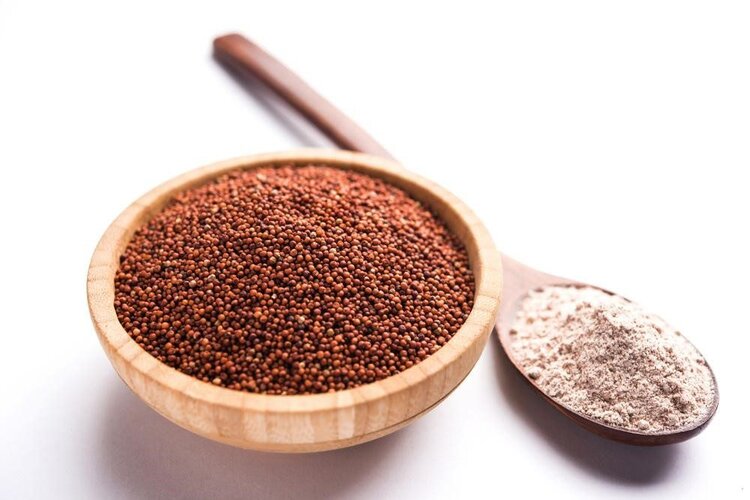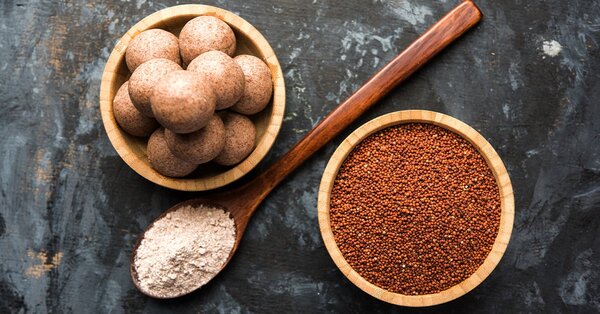Ragi Flour Nutrition: Understanding the Facts About Calories, Protein, Fat, Carbs, and Vitamins
Ragi flour, also known as finger millet flour, is a nutritious gluten-free flour that is becoming increasingly popular in many parts of the world. This article aims to provide a comprehensive guide to ragi flour nutrition, including its calorie content, protein, fat, carbs, and vitamin content.
What is Ragi Flour?

Ragi flour is a type of flour that is made from the seeds of the finger millet plant. This plant is native to Africa and Asia, and is known for its drought resistance and ability to grow in poor soil conditions. Ragi flour is commonly used in South Indian cuisine, where it is used to make a variety of dishes such as dosa, idli, and roti.
Ragi Calorie
Ragi flour is a low-calorie flour that is an excellent choice for those who are looking to manage their weight. One cup of ragi flour contains approximately 370 calories, which is significantly lower than other types of flour such as wheat flour or all-purpose flour.
Ragi Flour Protein Content
Ragi flour is an excellent source of protein, with one cup of ragi flour containing approximately 10 grams of protein. This makes ragi flour an excellent choice for vegetarians and vegans, as it can help to meet their daily protein requirements.
How Much Is The Fat Content In Ragi Flour
Ragi flour is a low-fat flour, with one cup of ragi flour containing only 2 grams of fat. This makes it an excellent choice for those who are looking to reduce their fat intake.
Ragi Carb Content

Ragi flour is a complex carbohydrate, which means that it is digested slowly by the body. This can help to keep you feeling fuller for longer, and can help to prevent spikes in blood sugar levels. One cup of ragi flour contains approximately 77 grams of carbohydrates.
Ragi Flour Vitamin
Ragi flour is a rich source of vitamins and minerals. One cup of ragi flour contains approximately 34% of the recommended daily intake of vitamin B6, which is important for brain function and the formation of red blood cells. It also contains approximately 15% of the recommended daily intake of iron, which is important for the formation of red blood cells and the prevention of anemia.
Health Benefits of Ragi Flour
Ragi flour has many health benefits, including:
Lowering Cholesterol Levels
Ragi flour is a rich source of fiber, which can help to lower cholesterol levels and reduce the risk of heart disease.
Ragi Flour For Diabetes
Ragi flour has a low glycemic index, which means that it can help to regulate blood sugar levels and reduce the risk of developing diabetes.
Is Ragi Good For Digestion
Ragi flour is a rich source of fiber, which can help to improve digestion and prevent constipation.
Ragi Millet Immunity Boosting
Ragi flour is a rich source of vitamins and minerals, which can help to boost immunity and prevent infections.
How to Incorporate Ragi Flour into Your Diet
There are many ways to incorporate ragi flour into your diet, including:
Ragi Roti
Ragi flour can be used to make a variety of Indian breads such as roti and paratha.
Ragi Idli And Dosa
Ragi flour can be used to make dosa and idli, which are popular South Indian dishes.
Baking with Ragi Flour
Ragi flour can be used in baking, and can be used to make cookies, cakes, and bread.
Can We Use Ragi Flour For Smoothies
Ragi flour can be added to smoothies and shakes to increase their nutrient content and provide a nutty flavor.
How To Prepare Ragi Porridge From Ragi Flour
Ragi flour can be used to make a nutritious porridge by mixing it with milk and sweetening it with honey or maple syrup.
Is Ragi Flour Good For Diabetics
Yes, ragi flour has a low glycemic index, which means that it can help to regulate blood sugar levels and reduce the risk of developing diabetes.
Is Ragi Flour Gluten Free
Yes, ragi flour is naturally gluten-free and can be a great option for those with gluten intolerance or celiac disease.
Ragi Flour Good For You
Yes, ragi flour is good for you as it is a nutrient-dense flour that provides a wide range of health benefits. Ragi flour is high in protein, fiber, and various essential vitamins and minerals, making it an excellent choice for those looking to maintain a healthy and balanced diet. Its low glycemic index also makes it a suitable option for those with diabetes, as it can help to regulate blood sugar levels.
Additionally, ragi flour is gluten-free, which makes it a great choice for those with gluten intolerance or celiac disease. By incorporating ragi flour into your diet, you can enjoy its many health benefits and delicious flavor.
In conclusion, ragi flour is a nutritious and versatile flour that can provide many health benefits when incorporated into a balanced diet. Its low-calorie and high-protein content make it an excellent choice for weight management, while its rich vitamin and mineral content can help to boost immunity and prevent chronic diseases. By including ragi flour in your diet, you can enjoy its many health benefits and delicious flavor.